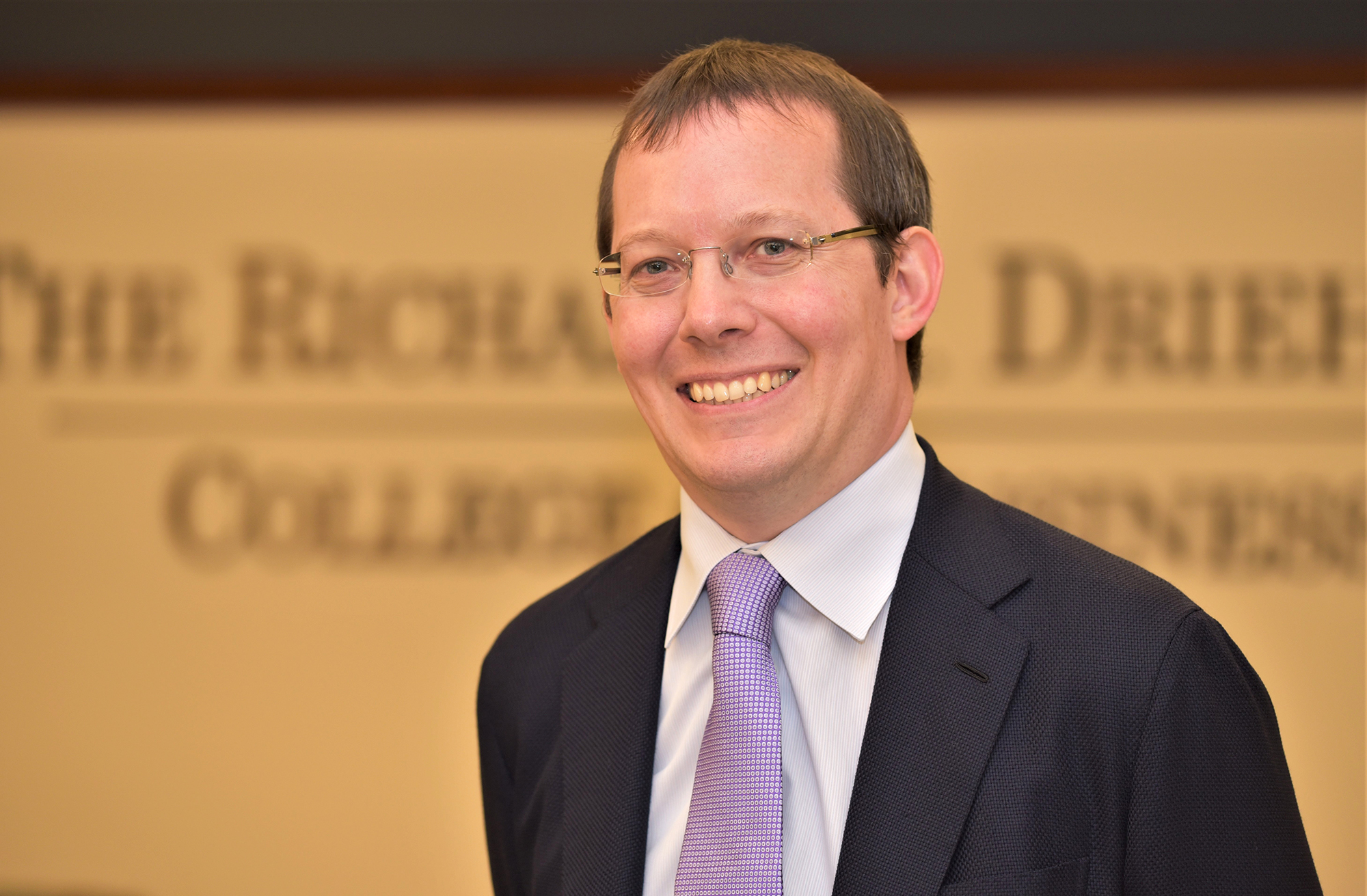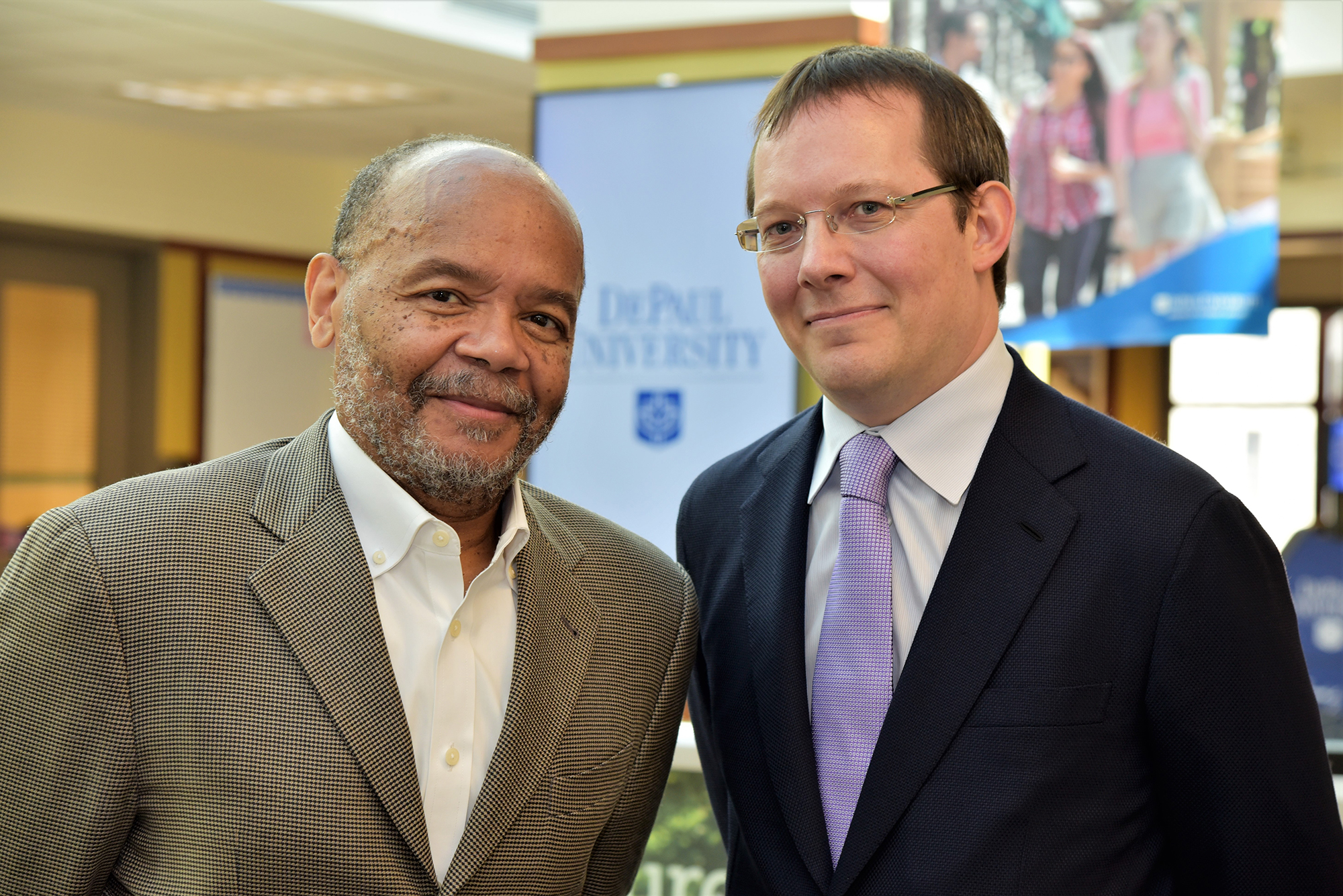 Christopher L. Keeley Chair in Investment Management Pavel G. Savor
Christopher L. Keeley Chair in Investment Management Pavel G. Savor
Since joining DePaul University’s finance faculty last July, distinguished scholar
Pavel G. Savor, the Christopher L. Keeley Chair in Investment Management, has stayed busy building an impressive research portfolio and teaching investment management classes.
Prior to joining DePaul, Pavel taught at Fox School of Business, Temple University, and the Wharton School, University of Pennsylvania. Originally from Croatia, Savor came to the states to earn his undergraduate degree in economics and international studies from Yale University, where he also earned a Master of Arts in Economics. He holds PhD and Master of Arts degrees in Business Economics from Harvard University. Before graduate school, he was a consultant at Cornerstone Research and led the mergers and acquisitions group at the pharmaceutical company Pliva d.d.
His research focuses on the relation between information and security risk and returns, as well as the effect of potential capital market inefficiencies on firm and investor decision-making. His research has won numerous awards, including the 2017 Amundi Smith Breeden Distinguished Paper Prize, an annual award given to the authors of the best finance research papers published in the Journal of Finance. Savor’s study, “Status, Marriage and Managers’ Attitudes Towards Risk,” which he co-authored with Wharton’s Nikolai Roussanov, compared marital status to risk-taking behavior. The report – which garnered national media attention – was published by the National Bureau of Economics Research and found that single executives take bigger risks than married ones.
In this Q&A, Savor discusses working with the John L. Keeley Jr. Center for Financial Services to bring more opportunities to students at DePaul.
What your responsibilities in your role as Keeley Chair in Investment Management?
The two primary roles of the chair are to lead research efforts in that field and also help our teaching efforts in terms of what classes we offer and how we place students. Certainly, the key role is to produce and help others produce research in the area of investment management. We are also working on the teaching front – we are trying to revamp our investments management class offerings, both in terms of broader offerings and in terms of courses that help students run a small student investment fund.
In fall 2018, I taught FIN 330, which is a course covering investments taken primarily by our majors, either as seniors or juniors. It teaches students how to think about the analysis of risk. Broadly speaking, investment management is how to think as an individual or as a professional money manager and how to think about deploying our capital. So it’s a broad topic but it focuses on things like asset allocation, how to estimate expected deterrence, how to estimate risk and how to make good investment decisions under uncertainty.
 Elijah Brewer, chair of DePaul's Department of Finance, and Paul G. Savor, newly appointed Christopher L. Keeley Chair in Investment Management.
Elijah Brewer, chair of DePaul's Department of Finance, and Paul G. Savor, newly appointed Christopher L. Keeley Chair in Investment Management.
You were born and raised in Croatia and always knew you wanted to study finance. How did you end up in the U.S.?
I went to an English-speaking high school in Croatia. It was not uncommon for people to apply to college in the states, so I did. It was different back then – you had to mail in everything, so you had to actually send in a physical application. And that’s it – I got into some schools, Yale among them and I went to Yale. I had been to the states before but I had never been to New Haven. I guess from today’s perspective it seems like a brave decision.
So I went to Yale and at some point I decided to major in economics. I liked the field. That was my goal when I came in. When I graduated, I kind of knew I wanted to go back to grad school. I worked for a while and thought, ‘Okay, I’m going to go back to grad school, go now or don’t go.’ And I went. And then I decided to stay in academia. I don’t think it was some conscious plan.
Among your research papers was a study that examined the impact of CEOs’ marital status on whether they take bigger financial risks. Why did you examine this topic and what is significant about the findings for business?
Our motivation for studying the topic was to explore whether and how executives’ circumstances influence their management style and decisions. The biggest takeaway is that it is indeed the case – at least for marital status – a finding which has numerous implications for how we think about choice of CEOs, their compensation and corporate governance in general.
How do you bring your professional experience and research into the classroom?
It’s a tough balancing act because clearly you want to bring it to the classroom but then you don’t want to overwhelm students because they are undergraduates and they are not practitioners or professors at other schools. I’ve been thinking about this for a long time, so it is a balancing act. My approach is to simplify but not over-simplify. If you think you can’t explain something to students without confusing them, then don’t do it. But what’s even worse is if you introduce a concept and then you over-simplify it to such an extent that they get the wrong message.
It’s a fundamental concept of economics – if something is riskier, you want some compensation to bear the risk. But if you don’t explain the background story and the context, then they get the wrong message – like oh, you should always buy when earnings are announced, returns are high, but that’s not the intended message.
To the extent you want to bring research into the classroom, you need to make sure that you can explain it sufficiently well and so that students understand fully what is going on rather than just taking away a two-sentence summary. So yeah, I try to pick my spots – I typically to do it more in the second half of the quarter. I think initially I just want to make sure they get the basic concept and some grounding in the field before trying to then go into the nuances.
What do you like about teaching at DePaul and being here?
Most of our students don’t have any exposure to finance prior to coming to DePaul, but they are very eager to learn. So far, I am very happy. It always takes a little bit of time to get used a new institution. One of the changes that I’d like to make is to somehow shift students to take FIN 330 early in their career so they can better choose to apply for jobs in investment management. Chicago is a good place for that so there’s a national advantage to DePaul. Chicago is a huge financial center, probably still the second biggest one in the country.
Learn more about:
MBA in Finance
MS in Finance
Undergraduate business degree in finance